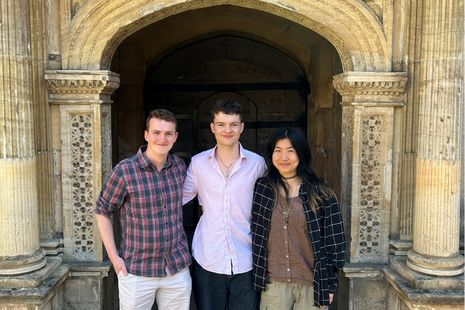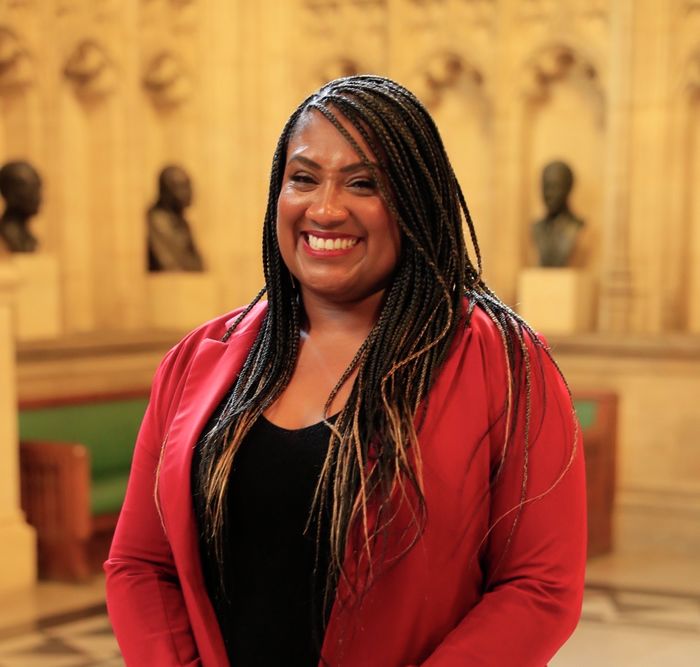‘Disagreeing agreeably’: meet the three Caians chairing CUCA, CULA and CULC
Alex and Duncan discuss navigating political differences and the ‘unique political climate of Gonville and Caius’ with the current leaders of the three political societies.

As Alex and I meet Oscar Poulson, Jack Peters, and Zoe Zhang by the Gonville and Caius Porters’ Lodge, the unique relationship between the three is immediately noticeable. As the heads of three of Cambridge’s biggest political societies, they have an unlikely friendship, and one that extends beyond their party roles. They credit their friendship as born out of the ‘unique political climate’ that Caius fosters.
In the basement of Caius Bar, they introduce themselves. Oscar is a second year reading History and Politics. Jack is also in second year reading HSPS, and Zoe is doing an MPhil in History of Religion. The three have positioned themselves on the sofa in front of us in a way that exactly maps onto their political leanings; Oscar on the left, Zoe on the right, and Jack in the middle.
“All three chairs of CUCA, CULA, and CULC are from one college: Gonville and Caius.”
For what they believe to be the first time, all three chairs of CUCA, CULA, and CULC are from one college: Gonville and Caius. Is this a mere coincidence or a product of something specific within Caius? When asked, Oscar cites the sense of community at ‘medium size’ Caius alongside the minimum dining requirement, which necessitates frequent social interaction and discussion between students. Jack agrees that these mealtime ‘debates’ give Caius “a distinct culture”. On top of this, Zoe mentions “Discussion, Dessert, Drink,” a regular forum run by the Dean of Caius for students to exchange ideas with each other. Caius is evidently a college with political and interpersonal debate at the heart of its community.
Indeed, the easy friendship between the three chairs is striking. Oscar makes jovial jokes about Jack’s ideology, and Zoe talks affectionately of many formals spent together. It appears that they enjoy each others’ company precisely because they disagree so much.
“They enjoy each others’ company precisely because they disagree so much.”
It’s refreshing to see discussions between those with contrasting political views not descend into the toxicity that one often finds in the public sphere. Conversation between the three remains on amicable, but definitely disagreeing, terms. Oscar notes that he and Zoe are at opposite ends of the “individualist-communitarian” divide. As a Conservative, Zoe believes in the “Kantian liberal tradition” – seeking a smaller state that protects individual freedoms whilst still providing a “basic standard of safety and wellbeing”.
Meanwhile Oscar attributes his perspective and involvement in left-wing politics to a “civic duty,” deriving from his Christian faith and previous volunteering at a food bank. Though his political vision and Zoe’s could not be more different, they both smile amusedly as the other describes their envisioned government and state.
Whilst Oscar and Zoe both have lengthy histories of participating in youth politics, Jack tells us that though he comes “from a family that is always talking [about] politics,” he simply “rocked up to Freshers’ Fair” last year. After speaking to all of the political societies he decided to try CULA, and “hasn’t looked back since”. He tells us that he’s especially proud of CULA’s trademark Spirited Discussions, an event which he claims even the other two chairs prefer to their respective Port- and Pints-based social events – to which the others jokingly made their disagreement clear.
Despite this rosy picture, how do they ensure that Cambridge’s political spaces aren’t echo chambers for each camp’s beliefs? Oscar argues that by “understanding other people’s perspectives and interacting with a range of views, politics can actually be a beacon of hope for people”. Equally, Jack admits to relishing the opportunity of debating at other political societies precisely because he disagrees with them, which then allows him to strengthen his own perspectives. Zoe concurs that it’s “boring to want everyone to think the same way,” adding that she doesn’t try to convert people, but focuses on creating productive discourse.
In a way, all three are somewhat atypical of their parties. Jack leads CULA despite not knowing as a fresher which political society to join. Zoe is a libertarian and a proud metalhead and Oscar is a Christian in an increasingly secular party. Perhaps it’s these nuances which help them to bridge the gap between CUCA, CULC and CULA, and, as they tell us, “disagree agreeably”. For all that they do disagree on, they are united in seeing Caius, and Cambridge as a whole, as an immensely important platform from which to grow both personally and politically. As Oscar summarises, if they looked back, they wouldn’t change a thing.
 News / Deborah Prentice overtaken as highest-paid Russell Group VC2 February 2026
News / Deborah Prentice overtaken as highest-paid Russell Group VC2 February 2026 Fashion / A guide to Cambridge’s second-hand scene2 February 2026
Fashion / A guide to Cambridge’s second-hand scene2 February 2026 News / Downing Bar dodges college takeover31 January 2026
News / Downing Bar dodges college takeover31 January 2026 Comment / College rivalry should not become college snobbery30 January 2026
Comment / College rivalry should not become college snobbery30 January 2026 Lifestyle / Which Cambridge eatery are you?1 February 2026
Lifestyle / Which Cambridge eatery are you?1 February 2026









